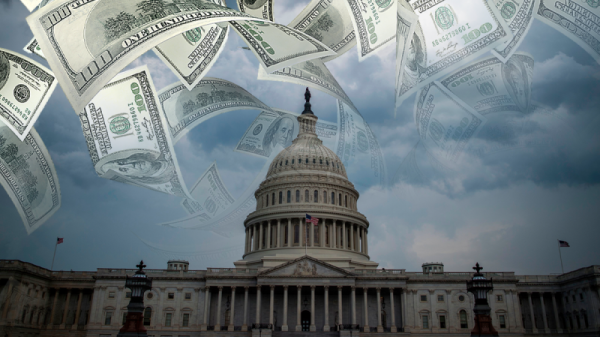There’s little question that Republican candidates on the ballot in November believe that immigration is the most useful issue for them to highlight. Fox News went from mentioning the border (or migrants or immigration) about 1,400 times in July to more than 9,200 times in February and over 9,600 times last month. This wasn’t obviously linked to the situation at the border; the number of people stopped at the border was about the same in February as it was in July, though higher in between.
There is similarly little question that President Biden and his party seek to frame the campaign as a defense of democracy itself. This is in part sincere, as Biden (and many others) fret about the repercussions of a second Donald Trump administration. It is also useful, centering the presidential choice on something other than the unpopular incumbent.
You can see this dynamic reflected in polling conducted by Quinnipiac University. In August, a plurality of respondents said that the economy was the most urgent issue in the country. Since then, immigration has steadily climbed, driven by Republicans citing it as the most urgent issue. Now, immigration, the economy and preserving democracy are all in the same range, with the latter issue the most common choice among Democrats.
Quinnipiac’s poll has the presidential race in a dead heat, as do most polls and as most polls almost certainly will until Election Day. Among those who say that immigration is the most urgent issue, Trump has a 73-point lead. Among those who say preserving democracy is, the 73-point lead is Biden’s.
But there’s a curious subtext to this. When Quinnipiac asked Americans whether democracy was working in the United States, Republicans expressed the most skepticism. Most Democrats said it was working; most Republicans said it wasn’t.
While most people didn’t indicate concern that American democracy would end in their lifetimes, Republicans were significantly more likely to say they had that concern than were Democrats.
So what gives? How is it that Democrats are so eager to preserve democracy but also are so confident that democracy is faring well?
The answer comes in another question presented by Quinnipiac. Asked how much confidence they had in the counting of the results of the 2024 presidential election, most respondents said they were at least somewhat confident. Most Republicans, on the other hand, said they were not so confident or not confident at all.
This comports with other polling showing that Republicans believe (incorrectly) that the 2020 election was tainted by fraud. If you think that President Biden’s election was illegitimate, as most Republicans (incorrectly) do, you are going to be dubious of the vote count in 2024, too. And you are going to think that democracy is already shaky, to put it mildly.
This is the distinction. Democrats generally understand that Biden’s win was legitimate and that Trump and his allies tried to block Biden’s inauguration. They worry that Trump will engage in other actions meant to subvert democracy and American institutions. But many Republicans think that subversion already took place. They think democracy is already damaged.
There’s an interesting coda to all this. Asked who is better suited to preserve democracy, responses were split on party lines, just as they were on the whom-do-you-support question. Democrats think Biden is better suited to defend democracy, as do independents by a small margin. Republicans say it’s Trump.
Only one of those answers can be right.
There’s little question that Republican candidates on the ballot in November believe that immigration is the most useful issue for them to highlight. Fox News went from mentioning the border (or migrants or immigration) about 1,400 times in July to more than 9,200 times in February and over 9,600 times last month. This wasn’t obviously linked to the situation at the border; the number of people stopped at the border was about the same in February as it was in July, though higher in between.
There is similarly little question that President Biden and his party seek to frame the campaign as a defense of democracy itself. This is in part sincere, as Biden (and many others) fret about the repercussions of a second Donald Trump administration. It is also useful, centering the presidential choice on something other than the unpopular incumbent.
You can see this dynamic reflected in polling conducted by Quinnipiac University. In August, a plurality of respondents said that the economy was the most urgent issue in the country. Since then, immigration has steadily climbed, driven by Republicans citing it as the most urgent issue. Now, immigration, the economy and preserving democracy are all in the same range, with the latter issue the most common choice among Democrats.
Quinnipiac’s poll has the presidential race in a dead heat, as do most polls and as most polls almost certainly will until Election Day. Among those who say that immigration is the most urgent issue, Trump has a 73-point lead. Among those who say preserving democracy is, the 73-point lead is Biden’s.
But there’s a curious subtext to this. When Quinnipiac asked Americans whether democracy was working in the United States, Republicans expressed the most skepticism. Most Democrats said it was working; most Republicans said it wasn’t.
While most people didn’t indicate concern that American democracy would end in their lifetimes, Republicans were significantly more likely to say they had that concern than were Democrats.
So what gives? How is it that Democrats are so eager to preserve democracy but also are so confident that democracy is faring well?
The answer comes in another question presented by Quinnipiac. Asked how much confidence they had in the counting of the results of the 2024 presidential election, most respondents said they were at least somewhat confident. Most Republicans, on the other hand, said they were not so confident or not confident at all.
This comports with other polling showing that Republicans believe (incorrectly) that the 2020 election was tainted by fraud. If you think that President Biden’s election was illegitimate, as most Republicans (incorrectly) do, you are going to be dubious of the vote count in 2024, too. And you are going to think that democracy is already shaky, to put it mildly.
This is the distinction. Democrats generally understand that Biden’s win was legitimate and that Trump and his allies tried to block Biden’s inauguration. They worry that Trump will engage in other actions meant to subvert democracy and American institutions. But many Republicans think that subversion already took place. They think democracy is already damaged.
There’s an interesting coda to all this. Asked who is better suited to preserve democracy, responses were split on party lines, just as they were on the whom-do-you-support question. Democrats think Biden is better suited to defend democracy, as do independents by a small margin. Republicans say it’s Trump.
Only one of those answers can be right.





















